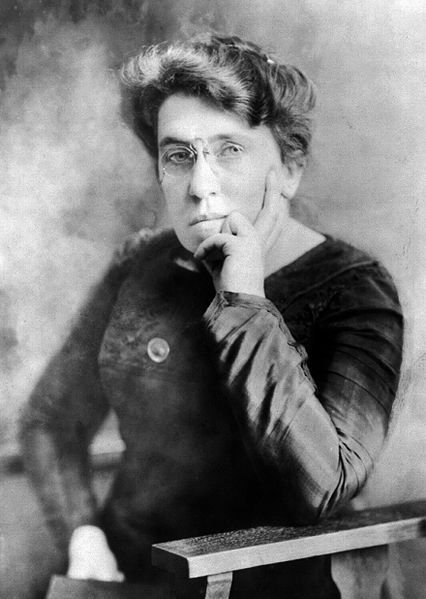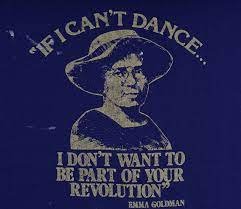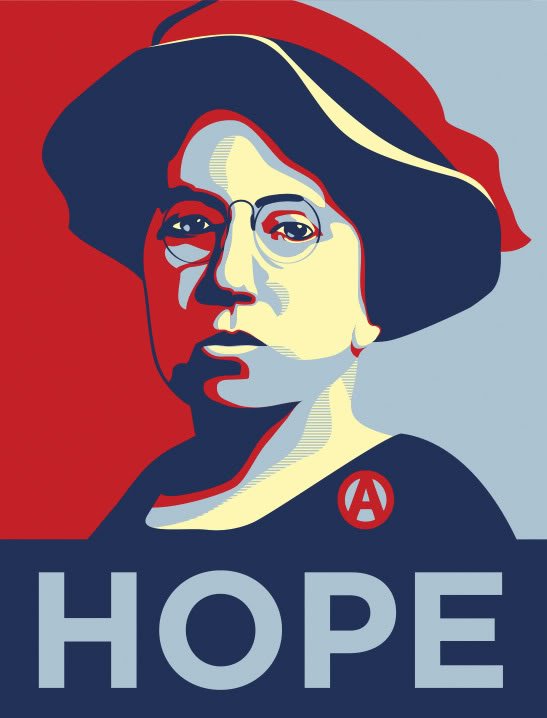There’s something magical about a good snow—as long as I don’t have to go anywhere in it.
Sitting back with some hot chocolate and imagining living inside a snow globe for a little while? That brings me a little bit of joy. We need to hold on to those things, those moments and activities that bring us joy even in the darkness.
There’s a line that’s often been attributed to activist and writer Emma Goldman, you’ll probably recognize it, maybe you’ve seen it on t-shirts or bumper stickers or some such. The line? “If I can’t dance, I don’t want to be in your revolution.”

Goldman never said that, but it distills things she did say into something we can all grasp easily. Yes, a revolution may be important from time to time, but it can’t be at the expense of that which makes us human, that which brings us joy, otherwise that’s just trading one joyless existence for another.
What did Goldman actually say? In her autobiography, Living My Life, she wrote of being scolded for taking too much joy a dance as “it did not behoove an agitator to dance, certainly not with such reckless abandon…My frivolity would only hurt the Cause.” She grew furious. “I did not believe that a Cause which stood for a beautiful ideal…for release and freedom from conventions and prejudice, should demand the denial of life and joy.” She went on to say that “I want freedom, the right to self-expression, everybody’s right to beautiful, radiant things.”
Of course, none of those quotes works for a t-shirt.
I’m not kidding either. How did her words get reduced down to this slogan? Back in 1973, a man named Jack Frager wanted to print up a bunch of t-shirts in honor of Emma Goldman and her activism to raise funds at a festival in Central Park celebrating the end of the Vietnam War.
He reached out to Alix Kates Shulman—who had just written a biography of Goldman and edited a book of her essays—in the hopes that she might be able to suggest a quote or two, maybe provide a photo of Goldman, anything.
In retrospect, she couldn’t recall exactly which quotes she gave him, but “everybody’s right to beautiful, radiant things” may well have been one. In gratitude, he promised her free t-shirts.
Imagine her surprise when those shirts arrived with this “If I can’t dance, I don’t want to be in your revolution” line. He had rewritten the woman he was supposedly quoting! But it was just a couple hundred t-shirts, no big deal. It’s not like something going viral on the internet or anything, right? And, as Shulman noted, the sentiment was pure Goldman.

Almost fifty years on, here we are with GIFs online proclaiming the line, t-shirts misquoting even that with “If I can’t dance, I don’t want to be part of your revolution,” posters and stickers and more. It even appears in a “non-sexist yet traditional” Passover Haggadah from 1983 as “If I can’t dance to it, it’s not my revolution.”
Now don’t get me wrong, I enjoy dancing. I even enjoy the game “Dance Dance Revolution.” But I want to go back to Goldman’s own words. She doesn’t just talk about dancing. She insists on freedom—and a freedom that does not deny life, exuberance, or joy. She wants the right to self-expression, and everyone’s right to beautiful, radiant things.
We should all know such joy, whether on the macro scale or the micro. A wedding, a birth, a mitzvah, of course. A good cup of tea, a favorite song in passing, a snow storm when we have nowhere to go. A memory of a perfect dance, a moment, a meal. Hold on to these joys wherever and whenever you find them. These are what make us who we are. And when we share that joy, that exuberance, it can be infectious—in the good way—and maybe brighten someone else’s day for a moment or more.
Rabbi Arthur Green might have agreed with Emma Goldman here. He wrote, “Imagine a religion that begins with ‘God wants you to be happy!’ Beware of anything that threatens to take away your joy. In the end it will probably take you away from God as well.”
He also wrote that “(a) mitzvah may be a ritual form or an act of kindness to others. The point is that doing it is meant to fill our hearts with joy. A mitzvah is a place where you can meet God; of course it makes you happy. We anticipate it and look forward to fulfilling it.”
May we all meet God where we can, may we all be open to joy wherever we find it, and may we bring that mitzvah, that kindness—that joy—to whomever we can whenever we can.

